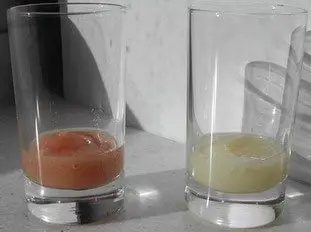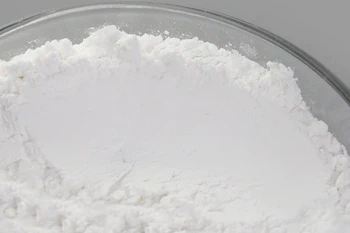This site uses only a few technical cookies necessary for its operation. By continuing to browse, you accept their use.
To find out more...
To find out more...
Vitamin C against blackening

You've probably heard of this tip: to prevent fruit or vegetables from turning brown or black, simply add or sprinkle lemon juice over them.
It's very effective, but why does lemon juice have this effect?
It's very effective, but why does lemon juice have this effect?
Last modified on: July 14th 2023
Vitamin C against blackening
Well, that's because it contains vitamin C, which acts as an antioxidant, not the lemon itself or its acidity.
Let's imagine you want to make a fruit purée, for a sorbet or a fruit coulis, pears for example: you peel the pears, remove the cores and blend the whole thing, it's very simple.
The problem is that the pear purée will oxidize very quickly and change color, while the taste will not change (or only slightly), but it will be less appetizing.
Here's the trick: add a pinch of vitamin C to your fruit purée (as you blend), and the result is spectacular.
Finally, a few examples of fruits and vegetables where vitamin C works wonders: avocados in guacamole, raw peeled purple artichokes (soaked in water with a pinch of vitamin C), strawberry or apricot coulis, etc.
As a general rule, whenever you have to soak something (vegetables or fruit) to prevent browning, systematically add a pinch or two of vitamin C to the water. You'll be amazed at how effective it is.
To sum up: a pinch of vitamin C in a preparation is highly effective in preventing the browning of fresh produce.
Let's imagine you want to make a fruit purée, for a sorbet or a fruit coulis, pears for example: you peel the pears, remove the cores and blend the whole thing, it's very simple.
The problem is that the pear purée will oxidize very quickly and change color, while the taste will not change (or only slightly), but it will be less appetizing.
Here's the trick: add a pinch of vitamin C to your fruit purée (as you blend), and the result is spectacular.


Finally, a few examples of fruits and vegetables where vitamin C works wonders: avocados in guacamole, raw peeled purple artichokes (soaked in water with a pinch of vitamin C), strawberry or apricot coulis, etc.
As a general rule, whenever you have to soak something (vegetables or fruit) to prevent browning, systematically add a pinch or two of vitamin C to the water. You'll be amazed at how effective it is.
To sum up: a pinch of vitamin C in a preparation is highly effective in preventing the browning of fresh produce.
Lasts posts
XO Cognac Explained: Meaning, Aging, and Flavor Profile
XO Cognac always goes beyond the labels on the bottle: it is often associated with tradition and quality. You get to appreciate the artistry, character and ageing process when you understand what defines this smooth Cognac. The section below tackles everything about XO Cognac, from complex flavour...January 28th 20261,068 Sponsored article
Butter vs. grease
We often read in a recipe where a pastry is put into a mould that, just before pouring, the mould should be buttered or greased. But what's the difference between these 2 terms?December 1st 20252,6625
Getting out of the fridge early
Very often when you're cooking, you need to take food or preparations out of the fridge, to use them in the recipe in progress. There's nothing tricky about this: you just take them out of the fridge and use them, usually immediately, in the recipe. But is this really a good method?November 24th 20251,7045
Who's making the croissants?
When you look at a bakery from the outside, you naturally think that in the bakery, the bakers make the bread, and in the laboratory, the pastry chefs make the cakes. It's very often like that, with each of these professions having quite different ways of working, but sometimes there's also one...November 23th 20251,561
Oven height
When we put a dish or cake in the oven, we naturally tend to put it on the middle shelf, and that's what we usually do. But in some cases, this position and height can be a little tricky, so let's find out why.October 8th 20255,2925
Other pages you may also like
Tranché, dissociated, failed, in short... missed!
When preparing a sauce or a cream, there's always a (small) risk that the creamy preparation you're working on will suddenly separate into two parts of different textures: a liquid part, for example, and a more or less solid part, or even become lumpy. It's terribly frustrating, but we'll see...June 19th 202314 K5
Preservative oil, an asset for taste
When you prepare a dish using an ingredient that has been preserved in fat, for example a springtime mixed salad with tuna in oil or sun-dried tomatoes, you're probably going to make a french dressing (vinaigrette) next. In that case, why not use the preserved oil from the tuna or tomatoes?June 5th 20248,0415
Should I believe my oven?
Can you really trust your oven? This is an important question as we are always tempted to take the temperature indicated as gospel truth and, unfortunately, this is rarely very precise. .July 4th 201133 K4.6
Stand mixer tools
Whether we call it a stand mixer, food processor, or simply refer to it by brand (Kenwood, KitchenAid, etc.), this machine is a valuable tool for amateur cooks, bakers or pastry chefs like ourselves. All these machines come supplied with 3 different tools. Let’s take a look at their names and...November 2nd 201938 K4.5
The power of sayings and beliefs in the kitchen
One day, in the comments on the recipe for beaten egg whites, a young woman asked if you could beat egg whites stiff while having a period, as a friend had told her it wasn't possible. Sometime later another person commented that for mayonnaise it had been (get this!) scientifically proven that a...February 6th 201152 K4.4
Follow this page
If you are interested in this page, you can "follow" it, by entering your email address here. You will then receive a notification immediately each time the page is modified or a new comment is added. Please note that you will need to confirm this following.
Note: We'll never share your e-mail address with anyone else.
Alternatively: you can subscribe to the mailing list of cooling-ez.com , you will receive a e-mail for each new recipe published on the site.










The 1 comment already posted on this page